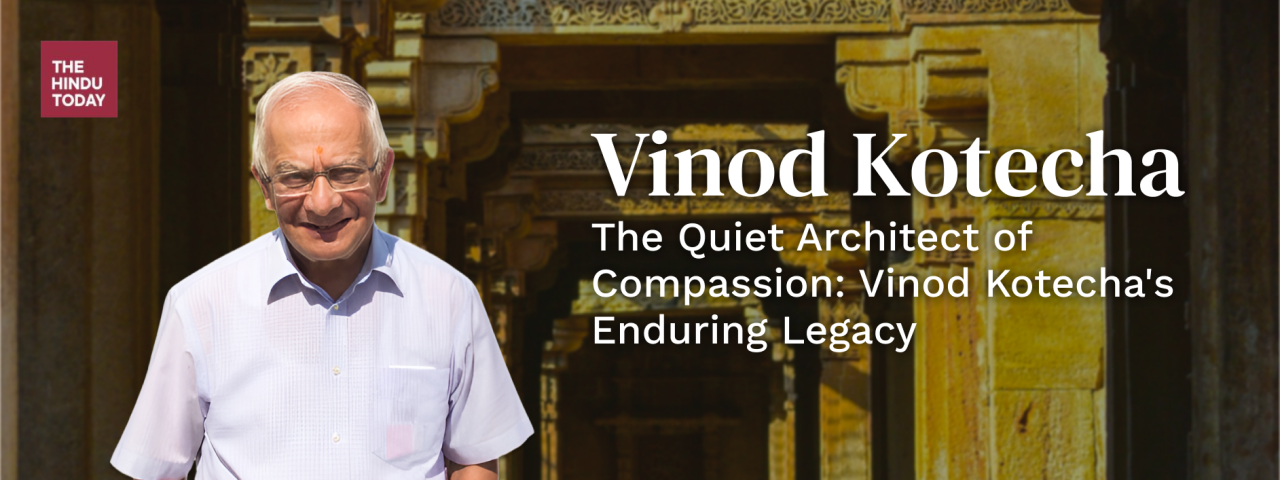

The Quiet Architect of Compassion: Vinod Kotecha's Enduring Legacy
In a year shadowed by personal and global trials, Vinod
Kotecha — known to friends and family as Vinubhai — reached a quiet
but profound milestone: guiding more than 4,000 bereaved households through
their final farewells. It was 2025, and as the chair of the Lohana Community
North London’s Bereavement Committee, he had turned what could have been
isolating rituals into threads of shared solace, especially for those
navigating loss in a fragmented world. This wasn’t a flashy ceremony or a
headline-grabbing event; it was the culmination of decades spent stitching
together the fabric of a diaspora community, one heartfelt gesture at a time.
Kotecha’s path to such impact began far from the
rain-slicked streets of North London. Born in Maragoli, Kenya, in the
shadow of his father’s unsolved shooting just months before his birth, and his
mother’s early death from tuberculosis when he was barely two, he learned
resilience not from textbooks but from the raw edges of survival. Those early
fractures instilled in him a fierce commitment to collective care — a value he
carried across continents when his family uprooted to the UK around 1971.
There, amid the grind of establishing a foothold in property development and
wholesale trade, he refused to let his heritage fade. Instead, he wove it into
the warp and weft of British life, becoming a steadfast figure in the Lohana
and wider Gujarati-Hindu circles of Watford and beyond.
His crowning public recognition came in 2017, when Queen
Elizabeth II bestowed upon him the British Empire Medal for his
unwavering support of North London’s Asian residents — a moment that
spotlighted not just his efforts but the quiet revolution he had sparked in
community welfare. Seven years later, in 2024, the Lohana Pride Organization
crowned him the World’s Best Lohana Sevak, honoring his blend of
charitable drive, crisis management, and efforts to pass down spiritual wisdom
to the next generation. These honors, earned without fanfare, underscore a life
defined by action over acclaim — from orchestrating traditional Hindu last
rites, complete with public prayers and logistical lifelines, to stepping up
during the COVID-19 lockdowns, where he pivoted to virtual memorials and
digital alerts, ensuring no family grieved alone.
At the core of Kotecha’s work lies his role within the Lohana
Community North London, where he served as sports coordinator for over a
decade and now steers the bereavement team with a steady hand. It’s here that
his ingenuity shines — adapting age-old ceremonies to the realities of the Zoom
era, coordinating everything from funeral logistics to emotional check-ins, all
while upholding the sanctity of Sanatani customs drawn from texts like
the Bhagavad Gita. Families recall his calm presence as a bridge — practical
yet profoundly spiritual — easing the chaos of grief into moments of dignity.
Kotecha’s reach ripples wider still. As a trustee for the Asian
Foundation for Help and the Lohana Charitable Foundation, he has
funneled resources into everything from palliative care drives to elder support
in Gujarat. Take the 2023 fundraiser at Harrow’s Dhamecha Lohana Centre:
partnering with the Lions Club, he curated an evening of performances
that raised £70,000 for St. Luke’s Hospice in a single night — a
testament to his knack for rallying communities around urgent causes. Through
the Lions Club of London Kingsbury, he bolstered international aid,
while his fingerprints appear on campaigns for Cancer Research UK, the NHS,
and Moorfields Eye Hospital. Over 20 years, he has quietly supported
thousands facing health or financial hardship, often extending help under the
radar.
Then there’s the Maa Saraswati Spiritual Centre,
which he launched in June 2017 as a beacon of cultural revival. Weekly sessions
dissect Hindu epics alongside Gita insights and self-improvement
readings, drawing in youth with interactive twists that make ancient lore feel
immediate and alive. It’s no small feat: in an age of fleeting attention,
Kotecha has kindled curiosity, ensuring traditions don’t gather dust but spark
dialogue. His personal touch extends to matchmaking, too — facilitating over
100 traditional Sammu Lagna unions in India, each a quiet victory for
cultural continuity.
The spotlight has found him sporadically — a 2018 nod at the
London Faith & Belief Community Awards for his volunteer spirit, a BBC
segment demystifying Hindu end-of-life rites, and features in outlets like Asian
Voice, which capture his blend of humility and hustle. Yet, for all the
plaques and accolades, it’s the unvarnished stories that linger — how, even as
COVID claimed a loved one in his own circle, he channelled sorrow into solace
for strangers.
What elevates Kotecha isn’t spectacle but substance — a man
who, at seventy-something, still shows up: tireless, unassuming, and steadfast,
embodying seva as both duty and devotion. In North London’s mosaic of
cultures, he doesn’t just preserve Hindu values — he fortifies them against
erosion, linking elders’ wisdom to the ambitions of the young. In doing so, he
reminds us that the most vital leaders aren’t those who seek the stage, but
those who build the unseen supports holding it all together.